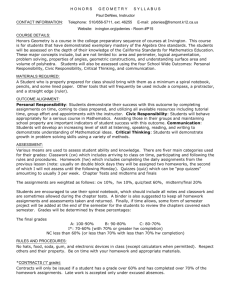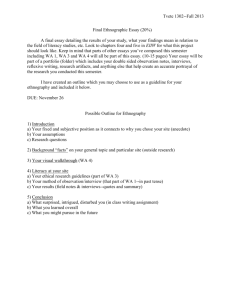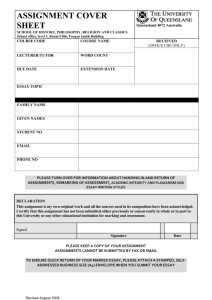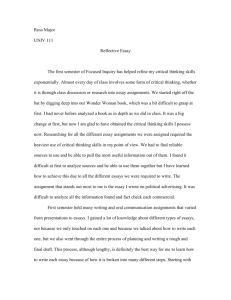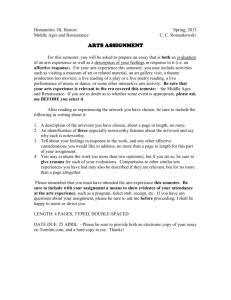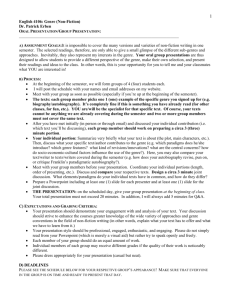English 1102 – Composition II - The University of West Georgia
advertisement
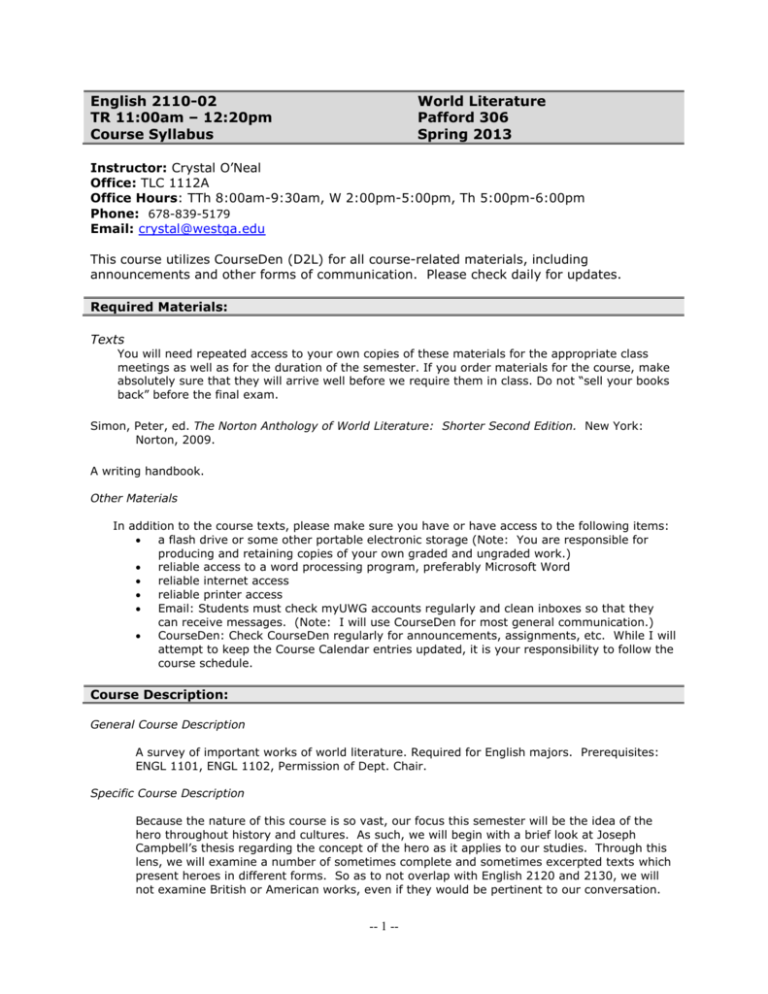
English 2110-02 TR 11:00am – 12:20pm Course Syllabus World Literature Pafford 306 Spring 2013 Instructor: Crystal O’Neal Office: TLC 1112A Office Hours: TTh 8:00am-9:30am, W 2:00pm-5:00pm, Th 5:00pm-6:00pm Phone: 678-839-5179 Email: crystal@westga.edu This course utilizes CourseDen (D2L) for all course-related materials, including announcements and other forms of communication. Please check daily for updates. Required Materials: Texts You will need repeated access to your own copies of these materials for the appropriate class meetings as well as for the duration of the semester. If you order materials for the course, make absolutely sure that they will arrive well before we require them in class. Do not “sell your books back” before the final exam. Simon, Peter, ed. The Norton Anthology of World Literature: Shorter Second Edition. New York: Norton, 2009. A writing handbook. Other Materials In addition to the course texts, please make sure you have or have access to the following items: a flash drive or some other portable electronic storage (Note: You are responsible for producing and retaining copies of your own graded and ungraded work.) reliable access to a word processing program, preferably Microsoft Word reliable internet access reliable printer access Email: Students must check myUWG accounts regularly and clean inboxes so that they can receive messages. (Note: I will use CourseDen for most general communication.) CourseDen: Check CourseDen regularly for announcements, assignments, etc. While I will attempt to keep the Course Calendar entries updated, it is your responsibility to follow the course schedule. Course Description: General Course Description A survey of important works of world literature. Required for English majors. Prerequisites: ENGL 1101, ENGL 1102, Permission of Dept. Chair. Specific Course Description Because the nature of this course is so vast, our focus this semester will be the idea of the hero throughout history and cultures. As such, we will begin with a brief look at Joseph Campbell’s thesis regarding the concept of the hero as it applies to our studies. Through this lens, we will examine a number of sometimes complete and sometimes excerpted texts which present heroes in different forms. So as to not overlap with English 2120 and 2130, we will not examine British or American works, even if they would be pertinent to our conversation. -- 1 -- Course Objectives: General Learning Outcomes: Students will develop the ability to recognize and identify significant achievements in world literature. Students will understand the relevant social, historical, and aesthetic contexts of these literary works. Students will appreciate the implications of theoretical and critical approaches to such literature. Students will develop enhanced cultural awareness and analytical skills. Students will demonstrate their command of academic English and of the tenets of sound composition by means of thesis-driven analytical prose. Attendance Policy: This class relies heavily on student participation, so your attendance is expected, and you should make every attempt to be present for each class. You are encouraged to exchange contact information with a classmate to discuss what you have missed and to check CourseDen regularly. If you know that you will miss a class, it is your responsibility to contact me before you miss to receive any assignments or other information. Department Attendance Policy Students may be administratively withdrawn from class based on the following attendance policy: For classes that meet three times a week, a student is allowed four absences. Upon the fifth absence, the student may be withdrawn. For classes that meet twice a week, a student is allowed three absences. Upon the fourth absence, the student may be withdrawn. Be aware that no distinction exists between excused and unexcused absences. If the withdrawal occurs prior to 4 March, the student will receive a grade of W. If the withdrawal occurs after 4 March, the student will receive a grade of WF. Department Behavior Policy Students may be dismissed from any class meeting at which they exhibit behavior that disrupts the learning environment of others. Such behavior includes – but is not limited to – arriving late for class, allowing cell phones to ring, speaking disrespectfully to the instructor and/or to other students, checking email or surfing the web, and using personal audio or visual devices. Each dismissal of this kind will count as an absence and will be applied toward the attendance policy above. Make-up Assignments There will be no make-up assignments to count toward missing daily grades or participation in class. There is simply no substitute for actually being in class and participating in our activities. If you must be absent on a process work day, you are required to submit your process work in advance. -- 2 -- Department Paperless Policy: As of Fall 2006, the English Department implemented a “paperless” policy in its classrooms. Therefore, all materials (handouts, assignment sheets, notes, etc.) will be made available online. Students may print these necessary course documents, including the syllabus, on their home computers . Academic Honesty: Plagiarism & Academic Dishonesty The Department of English and Philosophy defines plagiarism as taking personal credit for the words and ideas of others as they are presented in electronic, print, and verbal sources. The Department expects that students will accurately credit sources in all assignments. An equally dishonest practice is fabricating sources or facts; it is another form of misrepresenting the truth. Plagiarism is grounds for failing the course. See also, excessive collaboration. The University policies for handling Academic Dishonesty are found in the following documents: The Faculty Handbook, sections 207 and 208.0401 http://www.westga.edu/~vpaa/handrev/ Student Uncatalog: "Rights and Responsibilities"; Appendix J. http://www.westga.edu/handbook/ Excessive Collaboration By the end of the term in both ENGL 1101 and 1102, students should demonstrate the ability to produce independent writing (writing without collaborative assistance of peers, writing tutors, or professionals in the field) that shows an acceptable level of competence. Although classroom activities and out-of-class assignments may highlight collaborative learning and collaborative research, excessive collaboration (collaboration that results in the loss of a student's voice/style and original claims to course-related work) is considered another form of academic dishonesty and therefore will not be permitted. Role of the Writing Center The role of the Writing Center is to offer consultation in which tutors question, respond to, offer choices, and encourage revision in student essays. Tutors do not evaluate or prescribe solutions to problematic areas in student essays, and tutors are specifically trained to avoid appropriating the student's work. For more information, visit the Writing Center online at http://www.westga.edu/writing. Consequences Plagiarism and other forms of academic dishonesty are serious infractions. Papers found to be plagiarized will receive a 0 for that assignment and possible failure of the course. Writing Studio: TLC 1201 Writing@westga.edu 678-839-6513 www.westga.edu/writing The University Writing Center works with students and other members of the UWG community to improve writing skills. What We Do: Discuss ideas, read drafts, and work through revisions of essays; we do not proofread MLA, APA, Chicago/Turabian, and other citation formats -- 3 -- Policies: Please make appointments in advance. We accept walk-ins, but we cannot guarantee that a tutor will be available. If you cannot keep your appointment, you must call or email us 24 hours in advance to cancel. If you do not notify us 24 hours in advance, you will be counted as a No Show. Please arrive at your appointment on time. If you are 10 minutes late or more, you will be counted as a No Show and will not be able to have your appointment. If you have 3 No Shows in one semester, you will not be able to have any more appointments for that semester. Disability Pledge: I pledge to do my best to work with the University to provide all students with equal access to my classes and materials, regardless of special needs, temporary or permanent disability, special needs related to pregnancy, etc. If you have any special learning needs, particularly (but not limited to) needs defined under the Americans with Disabilities Act, and require specific accommodations, please do not hesitate to make these known to me, either yourself or through Disability Services in 272 Parker Hall. Students with documented special needs may expect accommodation in relation to classroom accessibility, modification of testing, special test administration, etc. This is not only my personal commitment: it is your right, and it is the law! For more information, please contact Disability Services at the State University of West Georgia. Grade Breakdown: Daily Grades and Participation: 10% (100 points) The majority of this grade will consist of your discussion of our readings in class. However, there may also be quizzes or other small in-class work that will be averaged into the grade. There is no make-up for missed quizzes, in-class work or participation in our discussions. Reading Responses: 20% (200 points) Over the course of the semester, you will be required to submit a 300-400-word reading responses to 10 of the works we are covering. Five of these must be submitted before the midterm, leaving five for after. Regardless of the number of days spent discussing a work, you may only submit a single response for the work. Please see the additional handout on information regarding reading responses. These will be due on the day we begin to discuss that piece or section without exception. If you must miss class, please email me an electronic copy of the response prior to class time. Please see the full assignment sheet for additional instructions. Presentation: 10% (100 points) During the first week of class, each student will sign up for a day to make 10-15 minute presentation of the work that we will be covering that day. You will cover cultural information about the context of the work and/or biographical information about the author. You must also submit a 3-4 page written essay of your presentation, including a bibliography of researched material. Remember to cite your sources in your essay as well. Please see the additional handout for specifics on the presentation and essay portion of this assignment. -- 4 -- Essay: 20% (200 points) By the end of the course, you will complete an 8-10 page essay. This is to give you a chance to develop an idea that you had or rework/rethink your original ideas. The essay should be thesis-driven and must incorporate research. Please see the additional handout on the particulars of the essay assignment. Midterm and Final Exam: 40% (400 points) During the course of the semester, you will complete two examinations. Your mid-term examination will cover all material from the first half of the semester, and your final exam will cover all the material from the second half of the semester. These exams will include a multiple choice section, short-answer section, and an essay section. Each of these exams will be worth 20% (200 points) of your final grade. Grading Policies: General Policy All work turned in must be typed and stapled if there are multiple pages. Papers should use MLA style documentation with 1" margins and 12 pt font. No title page is needed. This of course excludes work done in class. Late Assignments All assignments must be submitted on time. If an extension is required, you must meet with me prior to the due date to discuss the particulars. Percentage Weights To calculate your own grade, please use the following percentages: A+=98%; A=95%; A-=92%; B+=88%; B=85%; B-=82%; C+=78%; C=75%; C=72%; D+=68%; D=65%; D-=62%; F=50% Extra Credit There are no opportunities for extra credit in this course. Grade Queries After final grades have been posted, if you feel I have made a clerical or mathematical error, I will be happy to check the math again. However, requests to re-consider final grades based on effort or eligibility (for scholarships, extracurricular activities, etc.) will not be honored. Likewise, requests to assign or grade work after the final exam will not be considered. All final grades will be posted on Banweb following the final exam period. No grades will be distributed via phone or email. -- 5 --

